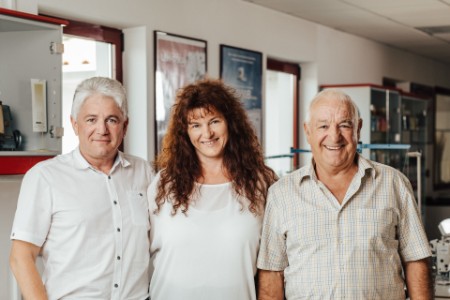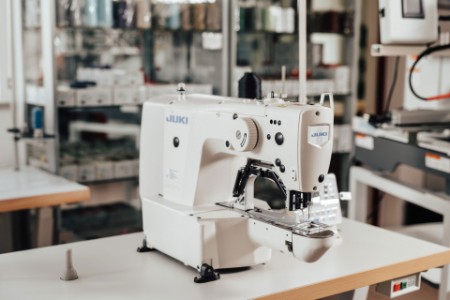
Chapter 1
A side business grows into a company
Their products and services are used by companies in the fashion, sports and automotive industries, in shoe-making, haberdashery, furniture and by embroiderers.
After a few years of spending their afternoons repairing sewing machines, father Marjan Godnič and his son Samo established the company Rigo in 1990 along with their partners, the Italian company Rimoldi. “The Rimoldi brand was the largest manufacturer of sewing machines in Italy. Since at that time we lacked funds, they supplied us with sewing machines. After that we decided that we would expand from repairs and try sales ourselves. I was the company’s first employee, followed by my father two years later and soon after that my wife joined us as well,” Samo explains. In a few years the company began to expand from their native Primorska region into the greater region of Slovenia, while also assuming a leading role in the field of sales and repairs of sewing machinery for domestic and industrial use. Their products and services are used by companies in the fashion, sports and automotive industries, in shoe-making, haberdashery, furniture and by embroiderers.
Over the years they have become familiar with, and more proficient in operating, their ever more demanding technology. Nowadays they sell computer programs for fashion designing, automated cutting systems and special machines for sewing and embroidering. “This is the latest technology that is available in the textile industry. This is where our knowledge comes into play and through it we are able to generate the biggest difference in price as well as more added value. We still sell our sewing machines in large quantities but we are more and more shifting towards a more automated approach,” Godnič continues and adds: “In our line of work the winner is the one who has the knowledge and who is quick in reacting to change.”
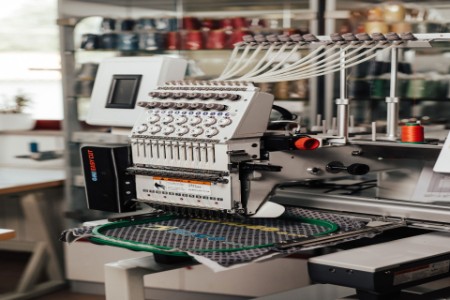
Chapter 2
Providing the complete package
"We offer our buyers a wide variety of services; plus, we are extremely flexible."
“We offer our buyers a wide variety of services; plus, we are extremely flexible. For instance, we can sell Jožica a needle that she needs for her domestic sewing machine, then, on the other hand we can also provide someone with the most complex sewing machines for cutting leather or fabric. If a farmer from Gorenjska needs a simple gadget to sew up his potato sacks, or if Lek needs a machine for medicine storage bags, we can provide both. We can also supply a suitable machine to a car seat manufacturer or to one upholstering furniture. Or we can sell an ironing cylinder to a chain of hotels,” is how Samo’s wife and Head of Finance Lilijana describes flexibility as their key value.
They buy parts and machinery from manufacturers and then assemble them themselves. “We buy the head in Japan, the motor in Germany, the board in Italy, valves in Slovenia and then we assemble all of that into a whole. That is how we create added value,” the General Manager explains. “We are not the most affordable but we do have skills, knowledge and a good attitude towards our buyers. Each machine is delivered to the buyer, and we organize special training for the workers that will be using it. We aim to provide a complete service.”
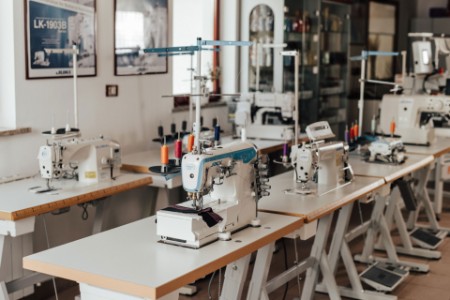
Chapter 3
Stretching their legs
As the textile industry’s crisis in Slovenia deepened at the turn of the millennium, the Godnič family expanded to foreign markets.
As the textile industry’s crisis deepened at the turn of the millennium, the Godnič family realized that Slovenia presented too small a market for their survival, and the business needed to shift its focus towards foreign markets. The first leap they took was south, to Bosnia and Herzegovina, where the conditions were similar to those in Slovenia. “You scratch my back, I scratch yours. That’s how it was,” Samo remembers of their early cooperation with small Bosnian companies. Today they still have a center in Tešanj where they started sales and repairs, but the small companies have grown and now have between 400 and 500 employees. The Godnič family still works with them. “The market grew fast and then companies like Burberry and Gucci came to sew in Bosnia and Herzegovina,” he further explains of the interesting state of the textile industry today.
Since Rigo has been successful in representing Juki, the Japanese brand known for having the best sewing machines in the world, Rigo’s suppliers began to encourage them to spread out - and so they did. In 2011 they entered the Serbian market where they established Rigo International, followed two years later by the FYR Macedonia-based Rigo Retex. All this time they have cooperated with most of the Croatian companies and future plans include expansion into Albania and Kosovo. The first steps have also been made into the Austrian market and occasionally they also sell specialized machinery into other European markets.
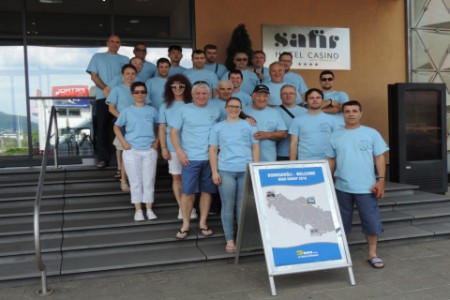
Chapter 4
Wanting to grow
"A company like ours is hard to manage."
When the company began the position of General Manager fell to father Marjan, who then led it for two years. Although father and son have different characters they never fought about work. One of the reasons could be that their responsibilities within the company were very clear from the beginning. “Even though we have completely different views, we managed to complement each other,” Samo explains. He took over the company from his father when he was 24. After the father let his son lead the company and soon retired, they divided the ownership of the company between them. Nevertheless, Samo is well aware that his father is always there to support him. “If I call him, he’ll drop everything and come. Rigo is still the number one priority for him. That is the bond.”
“A company like ours is hard to manage,” is how Samo sees it. “On the one hand we are fairly small but we operate in different markets. Myself, I am in the role of owner, management board, General Manager... the personal responsibility is enormous.” What is also demanding is managing personal relationships, since he and Lilijana spend 24 hours a day together. As a rule, they do not discuss business at home. “It’s not easy to switch between the business and personal parts of life. When we go on vacation we usually talk of work on the first day and then no more,” Samo continues.
When they think of the company’s future, inevitably this involves their 16-year-old daughter Sara, but they are giving her full freedom of choice. Even though this year she worked in the company for the first time, they are not quite sure if she will want to continue the family story. “We might have to pick someone else to follow the line. Whoever that may be, he or she will have to be very familiar with our specific line of work and above all, we will have to trust them,” is how Samo contemplates the issue of a successor. They are even thinking about selecting the next General Manager from among the staff, or even from outside. This would not be a novelty since two years ago they entrusted an outside manager with reorganizing the entire work process, introducing “safety nets” and regulations. “Without these rules we saw that the company was at a standstill and we wanted to grow,” he explains.
Their ambition for growth is to continue expanding their knowledge base, maintaining a capable leadership and securing a certain future for the company. Rigo aims to increase revenue six fold in the next 10 years and they want to operate in nine different countries.
Summary
Rigo in a nutshell: knowledge, experience, flexibility, quality, teamwork.
